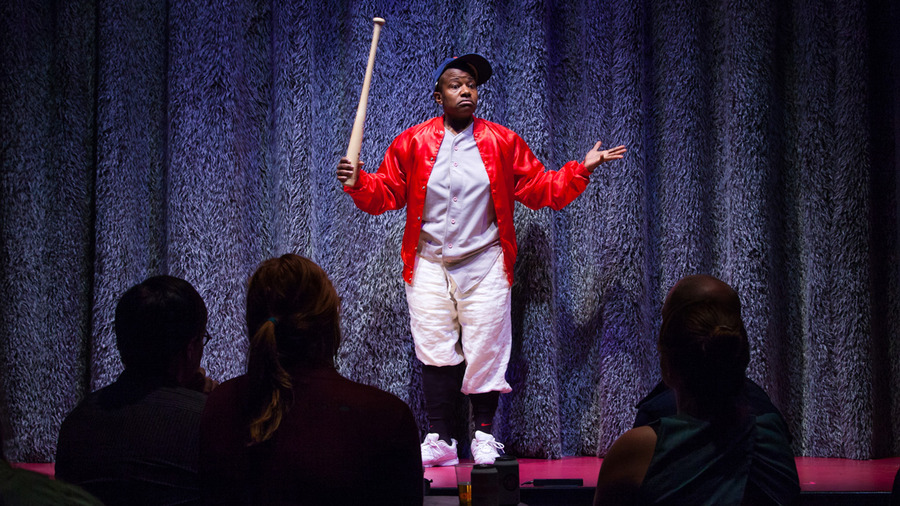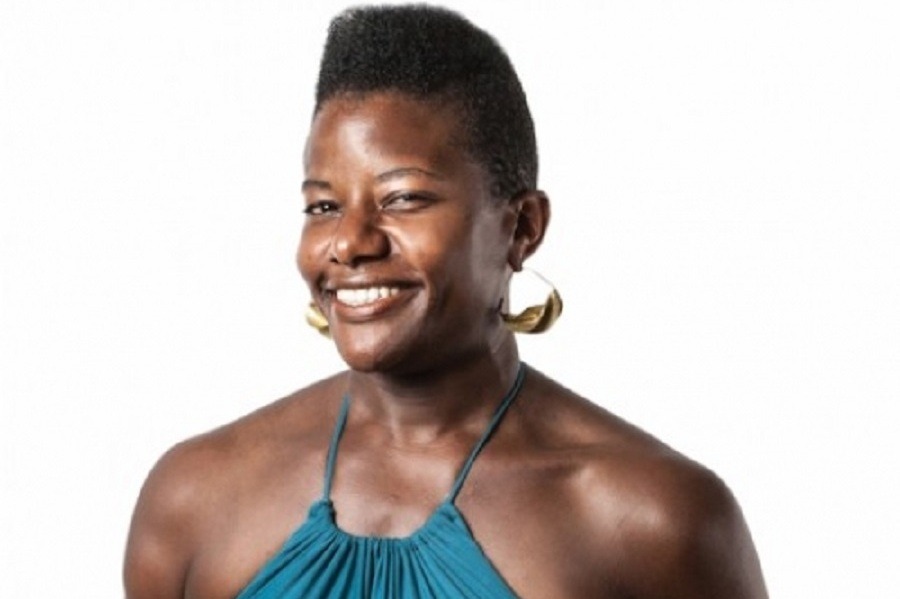Jennifer Kidwell arrived for our interview wearing what can only be described as a gray sweatshirt onesie. She kicked off her shoes and folded her legs under her, ready to talk about her new show, Those With 2 Clocks, which she has co-created as part of Tall Order, a triumvirate she forms with fellow Philadelphia theatre artists Jess Conda and Mel Krodman, and which will launch the 2022-23 season at the Wilma Theater in October.
When asked her about the show’s title, she cited the adage, “Those with one clock always know what time it is; those with two clocks are never sure.” (This makes the fact that she arrived a tad late for our talk just a little bit funny.) She added another “tangential” adage to her explanation: “Even a broken clock is right twice a day.”
The show is described as a five-part “comedic takedown of patriarchy.” It opens with a lecture/demonstration about comedy and laughter, and will then put its theory into practice. It proceeds with a collection of vignettes, followed by what Kidwell described as a “naturalistic drag show as if we were performing Beckett.” She told me that in the piece’s fourth section, “We kill that off,” and the show ends with an invitation to the audience to cross “a new threshold,” a moment in which we will be “holding space with other community members: veterans, threshold choir singers, doulas, and we’re trying to partner with a stripper coalition.”

A woman with a small chip on her sizable shoulders, Kidwell doesn’t like to pinned down. “Inherently in defining anything,” she explained, “there’s a necessary confinement. It’s implying that things are spaced apart from each other: ‘I’m drawing a border around this thing.’ One of the things we’re questioning is, why do things have to be defined in this way? Why do we have to know? What does it mean to be in relationship? The goal is not to prove anything; it’s to propose.”
When I asked if anything about making Those With 2 Clocks surprised her, she thoughtfully worked through her reply, finally offering that she was “startled, disappointed, shocked” by her own participation in the patriarchy. “A lot of the work is unlearning.”
My rude question, “How do you make a living?,” triggered long and loud laughter.
“I’m not an extravagant person, and I’ve been fortunate in my relationships,” she finally replied. She prefers working collaboratively, she continued, because “it’s fun, it’s social.” Her stage daring is echoed by her willingness to meet physical challenges: She learned to scuba dive and face her fear of the octopus when Pearl/D’Amour’s recent show Ocean Filibuster took her the Caribbean, and a sculpture project took her to New Orleans, where she found herself welding in 90-plus-degree heat. Ever in debate mode, her abstract arguments are filled with geometric metaphors like the “triangulation of life” and dismantling the “pyramid” of the social structure. She clearly doesn’t like things with tops.
In reply to my pedestrian question, “What is the show about?” she asked what I meant by that. At the risk of sounding hopelessly conventional, I wondered: Does it have a plot? Who are some of its characters? She told me the show has many, many characters, and suggested that if someone were to engage with the show, they “could make a case for many, many plots, or if someone else found no plot, all those opinions would be valid.”
How all this will interrogate the patriarchy will have to remain to be seen, although it’s clear that Kidwell would not give the patriarchy the time of day. She referred often to her “loving community,” each mention accompanied by a hand on her heart. This community includes not only Conda and Krodman, the two who are her collaborators on the show, but a crew who are part of her theatremaking process, who have all joined forces as a collective called Tall Order.

While Kidwell had worked for years at the Wilma and with such companies as Pig Iron, it was her Philly Fringe collaboration with Scott Sheppard on the show Underground Railroad Game in 2016 that brought her to a wider audience, as the show played to acclaim at Off-Broadway’s Ars Nova and won an Obie. This brilliant, hilarious, and fierce indictment of racism presents two middle-school teachers—the audience is cast as the students—who team up to create a game to make history come alive. Little Black dolls are hidden in various spots around the school, and students, divided between the Union and Confederate armies, have to transport the dolls to safe houses or else capture them. When a student writes an ugly racist epithet on one of the game’s signs, the community—apparently only a cherished delusion—falls to pieces. Post-racial America, my foot.
At my suggestion that it must have been gratifying to have what began as a small Fringe show recognized in such a large way, Kidwell resisted, declaring that she is trying to “wean herself from that kind of thinking,” i.e., that the goal of making theatre is to win a prize; she said she found it far more meaningful to have someone backstage at the Obies ceremony tell her how the show had an impact on him.
What does Those With 2 Clocks have in common with Underground Railroad, I wonder? Both shows are built around “disrupting,” Kidwell said. “I think patriarchy and racism offered some people some stability, so my idea is to shake up that stability and see what is possible. They are both corrosive projects,” she said, albeit with a constructive takeaway: “There are so many other ways we could be.”

Kidwell was born in Baltimore in 1978, where she says she briefly harbored a childhood ambition to be a garbage collector. Replacing that were a variety of possible careers: comedian, saxophonist, photographer. After finishing a degree in literature at Columbia University, she stayed in New York City for 11 years, toyed with the idea of becoming a lawyer, then realized that what appealed to her about the practice of law was the “performative aspect of litigation.” She finally realized that she would become a theatre artist and moved to Philadelphia, where she has remained ever since as an “associated theatre artist” at the Wilma.
Not that she is confined by the stage. She is currently working on her first self-originated sculpture project, made of up-cycled or reused materials; the piece is always moving because of bouyancy, since it’s sitting in the water it is recycling.
“It’s based on a dream I had of a dome made of cast iron skillets; a friend told me it was like cacerolazo, the Catalan women’s protest where they bang on pots,” Kidwell says. “The sound of the rain hitting the dome is as if the planet is making its own protest.”
When I ask where I might see this, Kidwell laughs and says she has no idea. We’ll have to settle for seeing her make her form-breaking art onstage.
Toby Zinman (she/her) is a writer based in Philadelphia.


